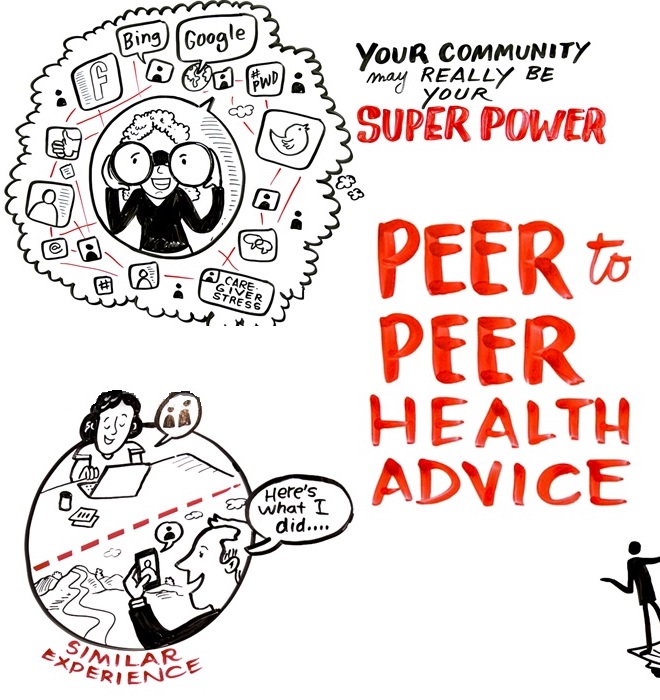
Friends, I have a personal request.
On Friday, December 8, Reframe Health Lab will release a video about peer health advice. It’s my best shot yet at inspiring people to go online not only for information, but also to connect with each other.
It was an honor to work with Mike Evans, MD, and Wendy Sue Swanson, MD, MBE, (who shares her wisdom in the video) and I get to retell one of Erin Moore‘s fabulous stories. The Robert Wood Johnson Foundation provided the funding (thanks, guys!) and Mike Heinrich made it all happen.
Our tag line is: When it comes to health, your community may really be your superpower.
Here’s where you come in: Will you, my community colleagues, be my superpower and help us get the word out about the video on Dec. 8?
- If you are on Twitter, Facebook, or Tumblr and are willing to donate a status update, please join my Thunderclap. (And if you’ve never heard of Thunderclap, check out this great profile of the founder, Dave Cascino.)
- If you’re not into automated tweets, that’s cool. Set a reminder on your calendar to tweet your personal take on Dec. 8!
- If you’re a blogger and you’d like include the video in a post about your own experiences with peer health advice, please send me a note (SusannahRFox at gmail.com) or leave a comment below and I will send you a sneak preview link.
Thanks for tolerating this detour into frank promotion! Now back to regularly scheduled content…
Im gonna make a buzz on Brazil
IN Brazil…
Thank you, Istvan! You taught me the wonderful phrase “a união faz a força” (the union makes the force) and I believe it. Can’t wait to see these ideas spread!
I’d honestly be lost without the diabetes online community. I’d love to share your video as part of a post on SixUntilMe.com about why community matters. Please send a sneak peek link!
Thanks, Kerri! Email sent 🙂
Hi Susannah – send deets and I’ll incorporate in my Dec 11 update.
Thanks! Email sent 🙂
Hi Susannah,
Matthew Katz ( @subatomicdoc ) and I submitted an idea a while ago that when patients are admitted to hospitals – they should get access to “peer to peer health” care community information, along with access to the hospital library, via a barcode on their bracelet?
I think P2P is a great idea, and I’ve been hoping that Nat’l Lib of Medicine would encourage the “social media” side of health info by telling local community libraries some “guides to teaching health literacy” or something like that.
Hoping that some of these ideas may get further because of your wonderful site here. Keep up the great work.
Sally
@jamesian
I love those ideas!!! Keep me posted — and I’ll keep my eyes peeled for similar programs.
Thanks, everyone, for contributing to an awesome roll-out day! I created a Storify for the tweets:
https://storify.com/SusannahFox/peerhealthadvice
Lisa Suennen’s blog post is the most in-depth so far:
https://venturevalkyrie.com/your-community-may-be-your-superpower-wisdom-from-susannah-fox/
If you see other posts or conversations about the video, please let me know.
Your focus on community as an untapped resource to provide patients with social support, empathy, caregiving, advice, etc. really needs to be acknowledged and appreciated. While it’s true that healthcare providers offer various levels of direct medical care, it’s actually our family, friends and local community that spend most, if not all, of their time with patients. Historically, our theory has been this: to improve health outcomes, we must fix various aspects of the healthcare system. The reality of this is that 80% of health outcomes are determined by non-clinical factors. And I strongly believe a tight-knit community can significantly influence health behaviors. Additionally, feeling connected to a community with shared values provides a sense of purpose and clarity that can’t really be measured quantitatively, but have been linked to improved health outcomes.
A recent article in the NY Times, “The Lost Einstens,” describes Raj Chetty and his team of researchers on the effects of living in neighborhoods with limited resources and/or professional networks. Chetty and his work make the argument that we, as a country, potentially lose out on the next entrepreneur or inventor, further linking to the economic angle of investing in those aforementioned areas.
I read the article and thought: not only are we potentially losing the next entrepreneur, but potentially an engaged member of the local community. Who knows if they would have been a community leader, volunteer, mentor, sports coach, etc. Chetty’s research opens the door to make these arguments as well.
If you’re at all interested, he’s presenting at Brookings on Jan 11 – https://www.brookings.edu/events/raj-chetty-on-the-lost-einsteins/
Thank you! I love Chetty’s work and — amazingly — I am free and in town on Thursday, so I registered to attend. Fingers crossed that the stars align and maybe we can meet, if you’ll be there too?